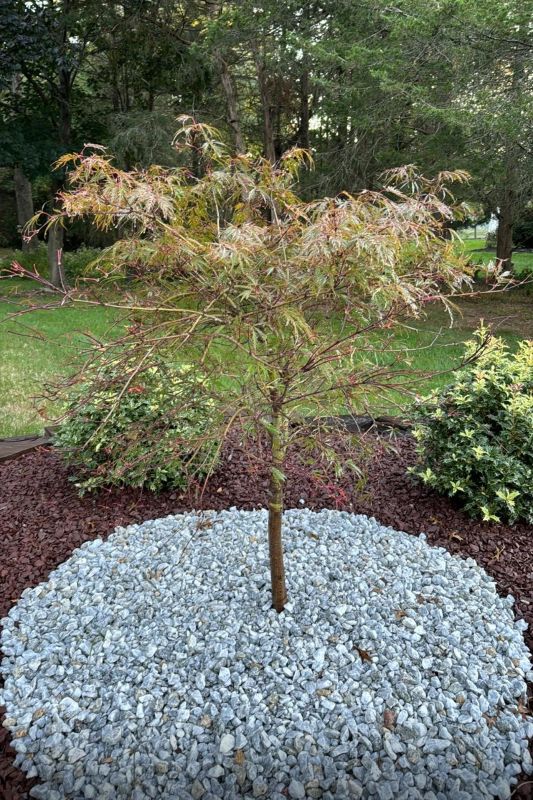Unfortunately for one Reddit user, the idea of planting non-native Japanese maple trees in U.S. soil isn't working out too well. To be fair, much of the problem probably boils down to knowing little about a Japanese maple's needs and covering the surrounding area with gravel.
The Redditor noted that the tree gets enough sunlight and is watered every three days via their sprinkler system. Even so, their tree has been losing the leaves near the bottom.

After one commenter noted the damage could be caused by deer, the original poster acknowledged deer had been eating other plants.
As many commenters noted, though, the rocks blocking the root flare are likely causing the main issues. Keeping the root flare exposed allows the tree to transport water and nutrients to its leaves. The rock mulch can also lead to an increased likelihood of decay and disease.
As Good Nature Organic Lawn Care warns, using rocks around trees also doesn't give them any nutrients like regular mulch, and it can cause harm to the roots.
The other factor for the Redditor is the type of tree. The Japanese maple, which is native to parts of Asia, might not be acclimated to the local climate. To avoid the issue, the OP could explore planting trees that are native to their area or switching to a native or rewilded lawn.
Watch now: How bad is a gas stove for your home's indoor air quality?
Installing a native plant lawn has many advantages.
Sticking with a native plant lawn saves money, requires less water and overall maintenance, and, because it stays alive without much input, creates a healthier ecosystem for pollinators. That's right: Your lawn can play an extraordinary role in the circle of life.
After all, pollinators facilitate the reproduction of many plants that produce and serve as food. Think about it like this: According to the U.S. Department of Agriculture, one in every three bites of food you take is because of pollinators.
That's pretty incredible and revelatory regarding your lawn's role. It's essential in drier climates. Mulching, organic soil improvement, and efficient irrigation (all part of xeriscaping) effectively incorporate native plant lawns.
 If you were to switch from a grass lawn to a more natural option, which of these factors would be your primary motivation?
If you were to switch from a grass lawn to a more natural option, which of these factors would be your primary motivation?
 Making it look better
Making it look better 
 Saving money on water and maintenance
Saving money on water and maintenance 
 Helping pollinators
Helping pollinators 
 No way I ever get rid of my lawn
No way I ever get rid of my lawn 
 Click your choice to see results and speak your mind
Click your choice to see results and speak your mind
After that, it's low maintenance, growth, and a bunch of happy bees. Even if you partially switch your lawn to a natural one, it makes a profound difference.
Returning to the Japanese maple, one Redditor remarked: "Expose that root flare and get that gravel out of there. Poor lil guy is getting cooked by them rocks."
Another referenced the climate in the Northern Hemisphere: "If you're northern hemisphere it will drop leaves over winter."
Someone else inquired about the OP's sprinkler system and if the tree was getting enough water. They suggested adding a drip line, noting: "Lots of ways to do this, it's a small PITA if you don't know what you're doing but it is very doable."
Join our free newsletter for easy tips to save more and waste less, and don't miss this cool list of easy ways to help yourself while helping the planet.









